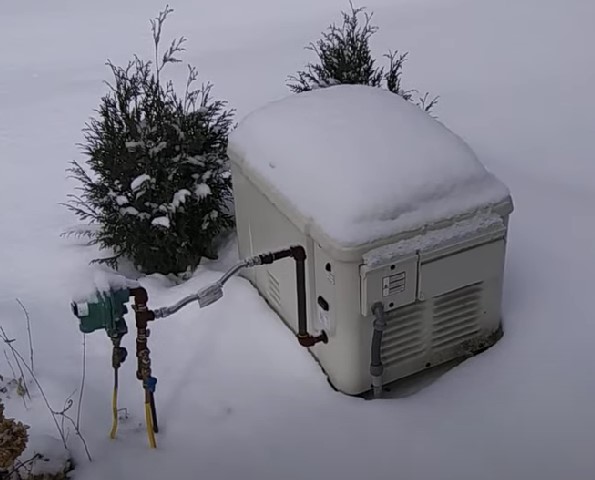Won’t your generator start in cold weather? Don’t worry. It is a very common scenario in the winter. If you dont run your generator in recent times, then it is not a matter of tension. You could follow this checklist to start your portable generator in cold weather.
without further ado, let’s get started.
Understanding Portable Generators in Cold Weather
Cold weather tends to thicken engine oil, making it more difficult for the generator to start. Fuel can also be negatively impacted, and batteries may not perform as efficiently.
Some generators are designed with features to withstand cold weather, such as carburetor heaters and battery warmers, while others may require more assistance to operate optimally in cold conditions.
Preparing Your Portable Generator for Cold Weather
Winterizing your generator is a crucial step in ensuring its performance during cold weather.
- Drain old fuel and add fresh fuel: Stale fuel can cause starting problems. It’s best to empty your fuel tank and fill it with fresh gasoline before the onset of cold weather.
- Use a fuel stabilizer: This can help prevent fuel from degrading and protect your engine against gum, varnish, rust, and corrosion.
- Check and replace spark plugs: A damaged spark plug can cause starting issues. Replace if necessary.
- Change engine oil for winter-grade oil: Thinner oil, specifically designed for colder temperatures, will improve engine start-up and running.
- Inspect the battery: Cold weather can decrease a battery’s efficiency. Ensure your battery is in good condition and fully charged.
- Check air filter: A clean air filter will aid in the engine starting process.
Procedures for Starting a Generator in Cold Weather
Here are step-by-step instructions to start your generator:
- Position your generator safely: Make sure it’s on a flat surface and in an open area away from windows and doors to avoid carbon monoxide poisoning.
- Turn on the fuel valve.
- Engage the choke: This helps in delivering a richer fuel mixture to the engine, making it easier to start in the cold.
- Start the generator: Pull the starter rope or press the start button, depending on your generator model.
- Gradually reduce the choke: As the generator warms up, slowly adjust the choke back to its running position.
Avoid running the generator on full choke for an extended period, as it may damage the engine.
Use of Cold Weather Kits and Accessories
Cold weather kits can significantly aid in starting and running your generator in cold weather. These kits usually include a battery warmer, oil block heater, and carburetor heater. These components can keep your generator warm, enhancing its ability to start in cold weather. Installation instructions vary by model, so always refer to the manufacturer’s manual.

Maintenance Tips for Prolonged Cold Weather Use
Frequent maintenance is key to prolonging your generator’s lifespan and performance during cold weather.
- Regular oil changes: Always use winter-grade oil for optimal performance.
- Frequent inspection of spark plugs: Replace them if they appear damaged or worn out.
- Routine checks on the fuel line and filter: Ensure they’re not blocked or damaged.
Always store your generator in a clean, dry place when not in use to protect it from the elements.
FAQ
Generac generator won’t start in cold weather
There could be a few reasons why your Generac generator won’t start in cold weather. Here are some of the most common reasons and their respective solutions:
- Old or Stale Fuel: Generators can have trouble starting if the fuel in the tank is old, stale, or contaminated. Cold weather can exacerbate this issue. So, Drain the old fuel from the generator and replace it with fresh fuel. You may also want to add a fuel stabilizer to prevent the fuel from degrading over time.
- Inadequate Oil Viscosity: The oil in your generator may be too thick for cold weather operation, which can cause the engine to have difficulty starting. So, Replace your current oil with a winter-grade oil that is designed for lower temperatures. This oil is thinner and will circulate better in the cold.
- Faulty Spark Plug: A spark plug that is damaged or fouled can prevent your generator from starting. Check the condition of your spark plug. If it’s dirty or damaged, replace it with a new one.
- Battery Problems: Cold weather can affect battery performance, and a weak battery may not have enough power to start the generator. Check your battery to make sure it is fully charged and in good condition. If your battery is old, it may need to be replaced.
- Lack of a Cold Weather Kit: Without an appropriate cold weather kit, your generator may not be able to handle freezing temperatures. Install a cold weather kit designed for your generator. This typically includes a battery warmer and oil block heater that will help your generator start in cold weather.
propane generator won’t start in cold weather
If your propane generator isn’t starting in cold weather, it could be due to a variety of reasons. Here are some potential causes and solutions:
- Propane Characteristics: Propane can be less effective in colder temperatures, especially if the propane tank’s pressure drops too low. Propane becomes less efficient as it approaches its boiling point (-44°F / -42°C), which can occur in extremely cold weather. Keep your propane tank as full as possible, and try to store the tank in a place that’s protected from the coldest temperatures, if it’s safe to do so.
- Faulty Regulator: The regulator controls the propane that goes into the generator. If it’s malfunctioning, it could prevent the generator from starting. Check the regulator and replace it if needed. Consult with a professional if you’re unsure how to do this safely.
- Spark Plug Issues: Like all generators, a spark plug that’s damaged or worn out can prevent your propane generator from starting. Inspect your spark plug and replace it if it’s dirty or damaged.
- Oil Viscosity: If the oil in your generator is too thick, it could prevent the generator from starting, especially in cold weather. Consider using a winter-grade oil that’s designed for colder temperatures.
- Battery Issues: Cold weather can affect battery efficiency, which could prevent your generator from starting. Ensure your battery is fully charged and in good condition. Replace if necessary.
If you’ve checked all these factors and your generator still won’t start, it’s recommended to seek professional help. A technician can diagnose and solve more complex issues that could be preventing your generator from starting.
Related:
- How to Use a Portable Generator During Power Outage?
- Best Fuel Stabilizers for Honda Generators
- Generator Choke Guide
Conclusion
Starting a portable generator in cold weather can be a challenging task. But with the right preparation and maintenance, it’s achievable. By winterizing your generator, following the correct starting procedures, using cold weather kits, and maintaining your generator, you can ensure your generator runs efficiently and reliably throughout the winter.
Recent Posts
Yes, synthetic oil can generally be used in generators. It offers superior lubrication, improved resistance to temperature variations, and longevity compared to conventional oil, which can enhance...
In today's digital age, our dependency on computers and other electronic devices is undeniable. But what happens when a power outage occurs? This is where generators come in. However, is it safe to...
